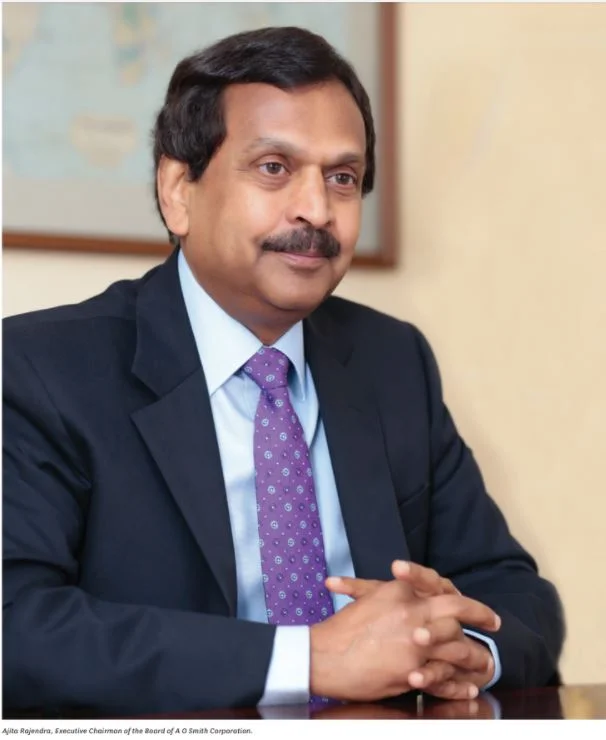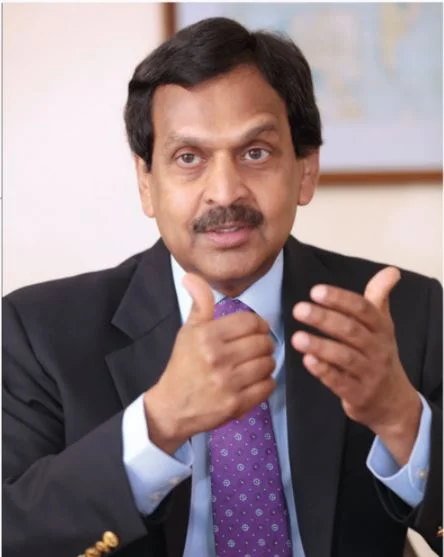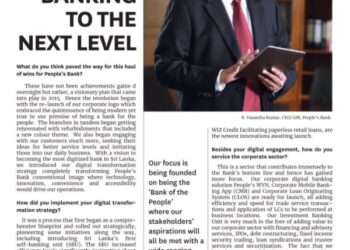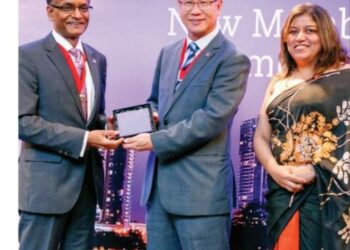
Integrity, honesty and always striving for excellence epitomize his corporate philosophy. He believes that a person’s word and actions reflect who they are. He is a leader and visionary with an aptitude for the qualitative and quantitative and an outstanding track record of achievement. Ajita Rajendra, Executive Chairman of the Board of A O Smith Corporation joined the Milwaukee-based water technology company in 2005 and rose through the organization to lead the team as Chief Executive Officer. He was named among the top 50 business persons of the year in 2016 by Fortune magazine and was ranked at number 34 amidst names such as Mark Zuckerberg, Jeff Bezos and Tim Cook. He is the first Sri Lankan from a manufacturing background to be recognized by Fortune magazine. He attributes his achievements to his ability to build strong aligned teams rallying around a well-developed strategy. He stresses that success is not about an individual but the entire organization. His tenure at A O Smith as CEO (2013-2018) has been marked by many achievements; sales increased from approximately 1.9 billion US dollars to over 3.0 billion US dollars. Earnings per share rose at a compound annual rate of nearly 21 percent during the same period, and A O Smith’s market capitalization grew from approximately 2.9 billion US dollars to 10.5 billion US dollars. Ajita Rajendra believes strong leaders surround themselves with outstanding people with shared values and principles, where everyone works towards achieving a clearly articulated strategy. He speaks about his experience working in North America, especially in leading a successful 145-year-old manufacturering company. Attributing his success to the strong foundation laid during his formative years in Sri Lanka and values learned from his parents, Ajita Rajendra advocates a well-rounded education that focuses on analytical and quantitative skills in addition to developing strong communications skills. He urges Sri Lankans to always put in the effort required to achieve the best possible results.
By Udeshi Amarasinghe and Keshini de Silva. | Photography Mahesh Bandara and Menaka Aravinda.
Who is Ajita Rajendra?
My parents grew up in Sri Lanka and I was born in Colombo. My father was the Treasury Secretary and also the Head of the Monetary Board. I completed my primary and secondary education at S. Thomas’ College, Mount Lavinia. Subsequently, I attended the Indian Institute of Technology (IIT) in Madras to study chemical engineering. After that, I traveled to the US to graduate school to study business administration at Carnegie Mellon University and at the Harvard Business School. My wife Dushi grew up in Colombo as well, and we have known each other since she was 14 years old and I was 16 years old. We have been married for 42 years. We have a son, Ashwin, and a six-month-old grandson.
You are the executive chairman of A O Smith. Could you tell us about that journey?
I decided to attend business school because I did not want to pursue a career in engineering. The university education I received in engineering was outstanding and was the ideal foundation to pursue my primary interest in business leadership. To further this, I decided to pursue a MBA at Carnegie-Mellon University. At that time, it was not possible to fund an overseas education and I had to finance my education by a combination of working and obtaining a loan. Later, during my career, I also graduated from the Advanced Management Program at Harvard Business School. This combination plus my work experience gave me a solid foundation to achieve success in my career. After my MBA, I joined Corning Inc., a large multinational corporation in North America. I joined as a financial analyst, in order to get a strong foundation in finance in preparation for a future business career. During my tenure at Corning Inc. I gained broad business experience through various positions in marketing, opera- tions and strategic planning. This enabled me to guide my career to obtain higher-level leadership positions in business.
In 2016, you were ranked at number 34 by Fortune 500 as one of the top 50 business people in a list that included the likes of Mark Zuckerberg, Jeff Bezos, and Tim Cook. Can you tell us about this experience? How significant was this milestone?
This was a very significant achievement, not only for me as the leader but also for the entire Corporation. It was recognition of the significant growth in revenue, profitability and market capitalization of the company that we had achieved under my leadership up to that point, relative to all the other public corporations. As the leader of an organization I have always fo- cused on creating a vision of the future and laying out a strategy to achieve it. A leader must be clear in what he/she wants the organization to do and also most importantly what not to do. I have always paid particular attention to select- ing exceptional people who can compete with anyone in the world. Everyone must support the organization’s strategy and be aligned with that strategy. There needs to be agreement within the team on the tactical game plan to execute the strategy. I was able to assemble the team and ensure the entire organization, not just the leadership, clearly understood what they needed to do to achieve our strategy. I have always supported my organization to ensure that they have had the resources, investment and the necessary tools for them to achieve their goals. It sounds easy, but obviously, it is very difficult to do in a global environment that is intensely competitive.
There are various ways to get to and to succeed in a CEO position. This involves having the right skills and experiences. Distilling that into a few sentences is difficult. The essence of this is hav- ing a vision and strategy, aligning with that strategy, gathering the best people and empower- ing them with the right tools to perform their job.
Fortune describes you as having kept the company ‘boiling hot’; ensuring profits, strength-ening the stock price as well as strong growth in North America and China. Why is that?
The business we are in is water purification and water and space heating for residential markets and the commercial market, which in- cludes hotels, hospitals, schools and other large commercial buildings. I believe ‘boiling hot’ was a pun or play on words when they say I kept it hot. However, the market capitalization of the company has grown significantly, which is good. Since I became the chief executive officer in 2013 until the end of last year, sales increased from approximately 1.9 billion US dollars to over 3.0 billion US dollars. The earnings per share rose at a compound annual rate of nearly 21 percent during the same period. The company’s market capitalization grew from approximately 2.9 billion US dollars to 10.5 billion USD dollars. I currently hold the position of executive chair- man of the board.
A O Smith is a 145-year old manufacturing company, which is also part of the S&P 500 index. When you consider the US market of today, there aren’t many 145-year-old manufacturing com- panies that are still relevant and thriving. I joined A O Smith, at a time when the company was not doing so well and was able to build a strong team and make a difference in its performace. I was subsequently appointed Chief Operating Officer and later appointed CEO of the company. A O Smith continues to perform very well, despite ups and downs in the stock market and stock prices. Our largest market is North America and one third of our revenue comes from China. We manufacture in North America, China, India, Europe and Turkey and sell our products around the world. In terms of the product, we offer residential and commercial water heating, water purification and air purification products and solutions. The market in the US is quite significant, and it grows at about four to five percent per annum. A large part of North America experiences extremely cold weather, therefore regardless of economic con- ditions people require hot water. If a water heater breaks or stops working, it is something that will be fixed even during difficult eco- nomic conditions. When it is minus 30-degree weather, you do not want to take a single cold water shower, you need hot water.
A O Smith Is A 145-Year Old Manufacturing Company, Which Is Also Part Of The S&P 500 Index. When You Consider The US Market Of Today, There Aren’t Many 145-Year-Old Manufacturing Companies That Are Still Relevant And Thriving. I Joined A O Smith, At A Time When The Company Was Not Doing So Well And Was Able To Build A Strong Team And Make A Difference In Its Performace.

I Do Not Believe That I Am An Exception. There Are Many Sri Lankans Across The Globe Who Have Been Very Successful. It Is About Recognizing The Right Opportunity And Taking Advantage Of It With The Right Focus.
You hold positions in other organizations as well. Can you elaborate on this?
I am also on the Board of Directors of The Donaldson Company. It is a company that is similar in size to A O Smith in terms of revenue. It is the dominant industrial air filtration company in the world. I am on the Board of Directors of The Timken Company, which makes bearings, anything from wheels to windmills. These companies are also over 100 years old and are well established, publicly traded manufacturing companies recognized as global leaders in their industries. I am also on the Advisory Board of the University of Wisconsin Business School and a member of the Board of Trustees of Alverno College.
How do you manage your time in all these roles and responsibilities?
I do not sleep. But jokes aside, managing time is a challenge – a CEO has to ensure that every minute is productive and achieves the best value. The most significant value for me is the time I spend with my family, which I will not com- promise. Moreover, you need to reflect and learn because becoming the CEO of a company does not mean you know everything. I believe you have to keep learning. Every year I try to attend a course for a few days to step away from the office and learn something new. There is also time for reflection and reading; you need to read to keep up with the world and to avoid becoming obsolete.
Sri Lankans are making a name in various sectors globally. What are your thoughts? You, for ex- ample, are a Sri Lankan and done well in the US.
I believe that the talent and education in Sri Lanka are outstanding. Sri Lankans can com- pete anywhere in the world. We have an advantage in that many Sri Lankans speak English, and it is a language skill that can be leveraged across the globe. Anyone from Sri Lanka has the educational background to compete anywhere in the world. Therefore, those who have migrated and worked hard, have done well. I do not believe that I am an exception. There are many Sri Lankans across the globe who have been very successful. It is about recognizing the right opportunity and taking advantage of it with the right focus. In the past, leaving Sri Lanka for new career opportunities abroad meant that one was essentially starting with nothing, due to the very strict exchange control restrictions When we moved overseas, we started with nothing, although we grew up in very comfortable circumstances in Sri Lanka. You have to work harder than anyone else, no matter where you are from. You must have the determination to always put in your best effort to stand out in a very competitive and fast moving environment.
I Believe That The Talent And Education In Sri Lanka Are Outstanding. Sri Lankans Can Compete Anywhere In The World.
You had an all-encompassing education where you took part in sports as well. How important is it to have such all-around exposure?
It is very important to have broad interests and exposure. Through sports, you learn how to play with the team or work with the team. You learn to depend on others and to leverage their strengths. Individual team members have different skills and roles, and they have to work together. Most of the sports that I participated in were team sports. Even in terms of athletics although there were individual events, there were team events such as relays. In these sports, it is not just you, but you are counting on others and they, in turn, are counting on you. Teamwork is essential and participating in sports trains you to work in a team environment and drives that determination to win. You do whatever it takes within the rules to win. Having many interests also dictates that you must learn to manage your time efficiently.
Few Sri Lankans from an engineering background enter management because many instead focus on academics. What is your advice?
I believe that an education in engineering enhances and cultivates your analytical and quantitative skills. Therefore, while you do learn to become an engineer, you also learn how to analyze and work with ‘big data’ which is essential in any field today, even medicine. You need to understand, interpret and process information. When I considered how I wanted to use that knowledge, I realized that I did not want to be an engineer. I saw the value in applying those skills to the entire business process. There were many other skills, such as finance, marketing, sales and product development that I had to learn before I could be a credible candidate for positions in business leadership. Therefore, I made it a point to cultivate those skills through my MBA and my work experience. Since there is a lot of competition for openings for general managers, my focus was on competing and aspiring to be better than anybody else. That is an ongoing process. I believe my conviction in knowing what I wanted to do was very helpful. At the end of the day, performance is what matters. Having a long and consistent track record of success is essential.
To Become A Leader, It Is Important To Develop A Team Of Outstanding People Around You. You Must Not Compromise On That. They Must Also Share Your Ethics And Values.
What is your message to the youngsters who aspire to be like you?
I have many messages. No matter what you do, always be ethical. Never compromise your honesty and integrity. Your word is who you are, and you are defined by it. Once you give your word, you must stick to it. That is what makes the individual. When you give your word, people should be able to count on it. You must also always comply with the law. Be ethical and do the right thing. At the end of the day, it is not difficult, because you know what is right and what is wrong. These qualities are important, and they should define who you are, which in turn will define the organization you lead. Without these qualities, you cannot be a leader. People need to respect you, and they will respect you for what you do and not for what you say. They watch your actions. Therefore, it is essential to be aware of how you conduct yourself. That is what I con- sider to be most important. You also need to have a specific focus in terms of what you want to do. You must work hard. It is a competitive world out there. Do not merely excel, but also focus on standing out by working harder than anyone else. It is not easy, but also remember to balance work and personal time effectively. Furthermore, to become a leader, it is im- portant to develop a team of outstanding people around you. You must not compromise on that. They must also share your ethics and values. You cannot have members of your organization who do not share your values. Just as you set the example, those around you must do the same. They should be outstanding and world-class in what they do. At the end of the day, it is not merely about one person, everyone must perform together. The values of how to conduct myself and the importance of honesty and integrity are aspects that I learned at home. I learned these from the time I could walk because that is how my parents behaved. That was imparted in me. They have been valuable lessons, and I have been fortunate. They set an outstanding example of being good humans, citizens, and always doing the right thing.





